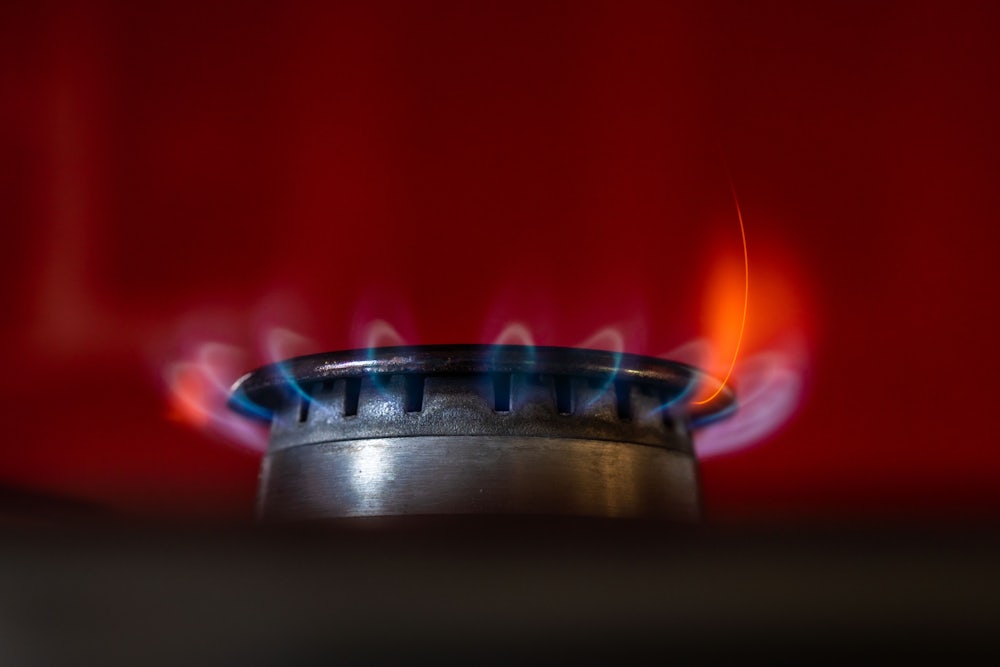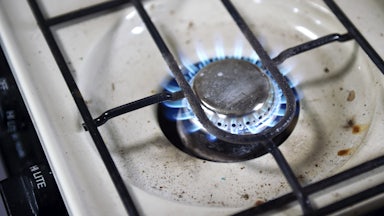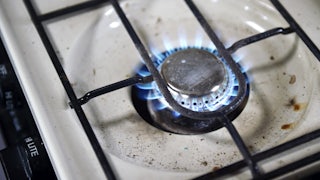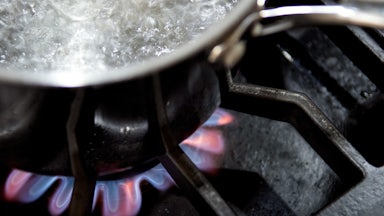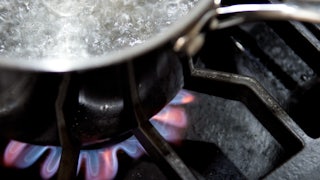To hear some tell it, gas stoves are just better: Induction stoves, one Brooklyn chef fumed at the height of the gas-versus-electric controversy last month, would be “impossible” in the context of “fine dining.” Another restaurateur grumbled to the Rupert Murdoch–owned New York Post that cooking with an electric stove “takes forever and people don’t like the results.” The right, and the fossil fuel industry, constantly score culture-war points by pitting the planet and public health against pleasure and convenience in this way.
But in the Great Gas Stove Debate, as in many other areas, this binary turns out to be false. We can curb air pollution and improve our health, while cooking delicious food and living our best lives at the same time. Residents of a Bronx housing project have just shown that it can be done.
While much of the gas stove debate focuses on the consumer choices of rich, white homeowners, residents of public housing typically “have little autonomy over housing conditions,” Sonal Jessel, policy director at WE ACT for Environmental Justice said in a press conference January 31 announcing the results of a pilot study the group funded. The study, which took place in a Hunt’s Point public housing complex, offered residents induction stoves installed at no charge in their apartments.
One finding of the study was unsurprising: dramatically improved indoor air quality. Households using induction stoves had a 35 percent reduction in daily nitrogen dioxide compared to NYCHA households using gas stoves, and the decrease in carbon monoxide was even more dramatic. The participants, several of whom suffered from asthma, noted that since the departure of their gas stoves, their symptoms had disappeared. They cheered the health effects and said they were happy not to worry that they or their children would be exposed to pollution.
But the study also highlighted a more surprising outcome, given all the propaganda around the superiority of gas: Participants all loved their new induction stoves. At the end of the study, they got to choose whether to keep the induction stove—and not a single person wanted their gas stove back.
In a video shown at the press conference, participants exulted not only about the clean air and their improved health but about how the induction stove made their daily lives better. They felt that the induction stoves were safer and made cooking and cleaning easier and quicker. Angela Norales, a participant in the pilot who had in the past been hospitalized with respiratory trouble after a gas leak in her apartment, said her induction oven “cooks very quickly and is easy to clean. This oven is totally divine.”
Hunt’s Point residents actually aren’t alone in thinking this, although you might not know it from the deluge of people taking to Twitter and the New York Post to trash kitchen electrification last month. Many professional chefs agree that induction is better—including Eric Ripert, the chef-owner of the legendary seafood restaurant Le Bernardin in New York. “It’s much more precise,” Ripert has said. Chefs say everything is quicker on an induction stove—from cooking dinner for hungry kids at home to getting meals out to diners in a restaurant. “Nothing compares to induction,” Anna Rossi, host of NBC’s Chef’s Pantry, told NBC News recently, explaining that induction stoves were easier to clean and more efficient: “Basically, 90 percent of the energy that is creating the heat is going into the food.”
What’s more, experts add that because the heat from induction goes into the food rather than the surroundings, it improves working conditions for whoever is doing the work of cooking, whether that’s a mother or grandmother in the Bronx or a line cook in a chic Manhattan eatery. Induction could retire the cliché “slaving over a hot stove,” making the work of cooking more pleasant.
While induction ranges have previously been more expensive than traditional electric or gas, prices have been dropping in recent years; new tax rebates in the Inflation Reduction Act for households are covering significant portions of purchase and installation costs, and the corresponding expansion of the induction market is widely predicted to bring prices down further.
WE ACT, needless to say, is not a neutral party in the gas stove wars, having focused on air quality justice since its founding in 1988. But with this study, it has highlighted a particularly effective way to combat gas industry propaganda. The video it released at the end of the induction stove pilot study rightly emphasizes the pleasure residents take in these improvements; residents show off their cooking, and a child eats a freshly baked cookie. It’s a reminder that with stoves, as in so many other issues, we don’t need to debate on the fossil fuel industry’s terms.
The idea that only fossil fuels can bring us comfort, luxury, and happiness has been carefully nourished by the industry since the middle of last century—a 1965 ad emphasizes that “all the fine restaurants” are “cooking with gas”—but it’s false. Induction stoves aren’t the only examples of how wrongheaded this narrative is. Clean air, clean water, and freedom from life-threatening storms bring us closer to the good life. But also, many of the changes we need to make to get to clean air and water bring us closer to that good life.
The fossil fuel industry—and the Tucker Carlsons of the world, who excel at stoking culture war on its behalf—insists that reducing emissions requires that we sacrifice pleasure and convenience. We already have many examples of how untrue that is. Mass transit, when it works well, is more convenient than sitting in traffic. The views from the train are nearly always more scenic than those from the interstate. Having more trees and wild birds around us boosts our happiness and well-being. Heat pumps can keep us comfortable while saving money. Now we can add induction stoves to the list.
